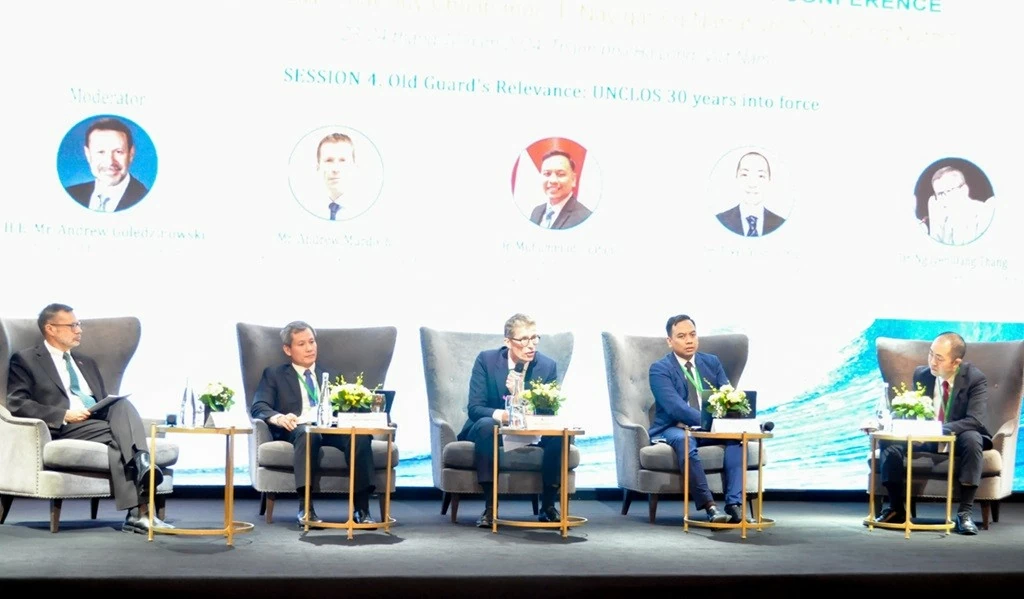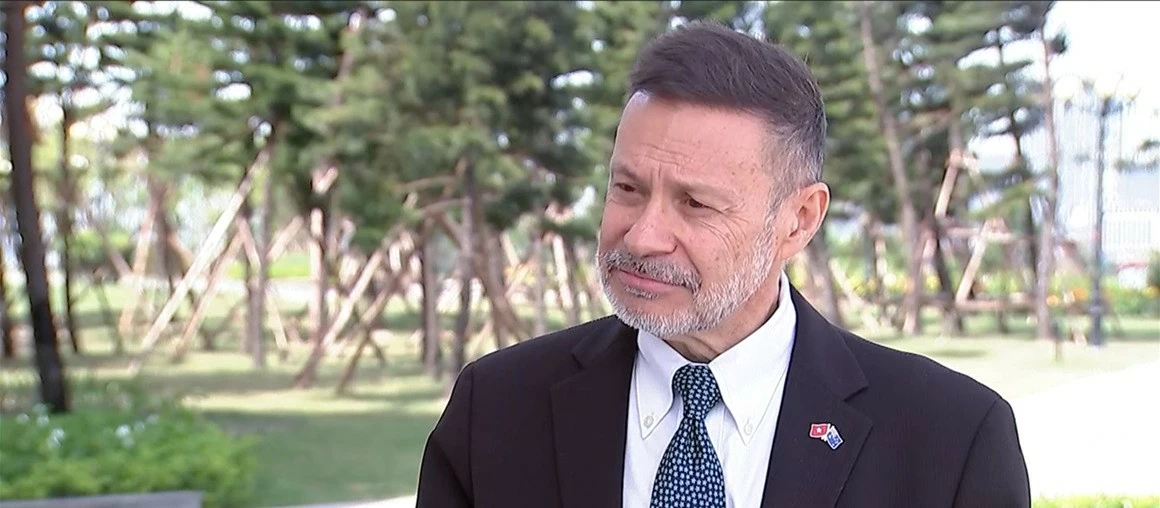
Vietnam has always been a supporter of the rule of law, including UNCLOS: Australian Ambassador
Latest
 |
| Australian Ambassador to Vietnam Andrew Goledzinowski (far left) chaired a discussion session within the framework of the 16th International Conference on the East Sea in Quang Ninh on October 24, 2024. (Photo: PH) |
Could you please comment on Vietnam's efforts in implementing the United Nations Convention on the Law of the Sea (UNCLOS) 1982?
Vietnam has always been a supporter of the rule of law. So Vietnam's role in UNCLOS, I would say as a leading nation, is really very important. This East Sea Conference, I think, reflects the fact that Vietnam is not just an adherent to UNCLOS rules but wants to be one of the countries which helps to support the norms which exist in this sphere.
The other aspect I would mention is Vietnam has just announced the fact that it is running its first ever candidate for the International Tribunal on the Law of the Sea (ITLOS). Now that's Professor, PhD. Nguyen Thi Lan Anh, Director of the East Sea Institute, Diplomatic Academy of Vietnam, she's an excellent candidate. The fact that Vietnam has chosen to run her as a candidate for ITLOS, I think is very positive and it's something that we can all welcome.
So in summary, Vietnam is playing its role and playing it very well.
What are your assessments of the value of UNCLOS after 30 years of implementation?
Well, that's an important question. Really, this conference today is all about UNCLOS at 30 years and is asking the question: Is UNCLOS still relevant? And the consensus which is emerging from all the expert speakers is that yes, UNCLOS is still very relevant.
It still remains the central pillar of the legal system which manages the oceans and seas. And that the real question is how to implement UNCLOS more effectively. Now, on the edges, there are some issues about some new technologies and new challenges which also has to be managed, such as undersea cables.
But those new challenges can still be managed within the framework and the umbrella of UNCLOS. So that is, I think, very clearly the view of all the participants here at this conference.
UNCLOS is still extremely important. It is the constitution of the oceans and the seas. So it doesn't change. We can, I think, add additional agreements where there are new challenges. And I mentioned submarine cables as well. We've seen in the adoption last year of the BBNJ how the international community is capable of adding to UNCLOS, but we do not want to take away from UNCLOS. That's the important distinction.
 |
| Australian Ambassador to Vietnam Andrew Goledzinowski shared with The WVR. (Photo: PH) |
What do you think about the current situation in the East Sea and the use of "grey zone tactics"?
Australia has made a number of statements expressing our concern at some of the behaviours that we are seeing in the East Sea. Everybody knows what the rules are and the rules at the moment are being exceeded in several important ways.
We're seeing some what we call “grey zone tactics” by large militias which are not just in breach of what has been the consensus understanding of the law governing these activities, but also is bringing about conflict, uncertainty and physical danger, including for innocent fisher persons.
The grey so-called “grey zone tactics”. That's where force is used, but below the threshold of war. It's something which is very troubling, it's something which is very dangerous and we think it is not consistent with the laws. That is a problem for the region and it's one that has to be resolved. And I know that some of those concerns has been increasingly vocal in speaking up about its concerns, along with many other countries. So we would urge those countries who are using “grey zone tactics” to return to a better way of operating.
We don't know what the future will be, but we hope that we will see a return to safe and disciplined activities which are within the framework of the law and abide by the rules of the ocean that we have agreed and adopted.
UNCLOS is still the central pillar and it still applies in the East Sea. The important thing now is to implement it. If a country chooses to ignore the rules, that is a problem. But that doesn't mean the rules are wrong.
Could you please comment about the role of AI in the management of the ocean?
Well, that's very interesting. I don't know very much about that. I think the application of modern technologies like cyber, AI, the other important technologies that are coming like quantum computing. I think all of these will play a role. But again, it's important that the rules of the oceans and the seas be complied with and that these new technologies are adopted in a way which is consistent with those rules.
I'm pretty sure that's what Vietnam will want to see and it's certainly what Australia wants to see.









